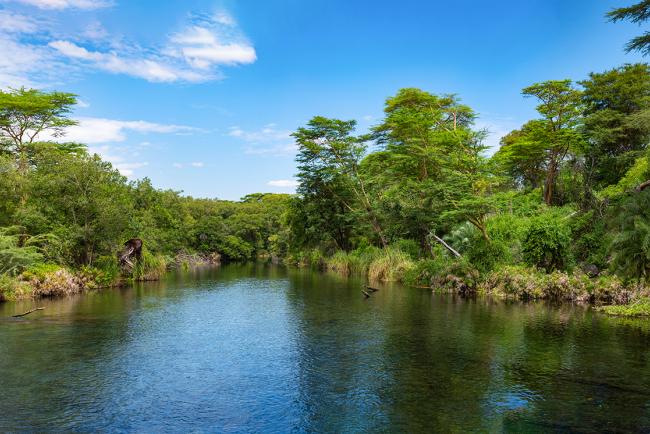Update on the Nile Basin Initiative Programmes

A technical briefing session of the Nile Technical Advisory Committee (Nile-TAC) was held on May 11-12, 2022 at the Commonwealth Resort, Munyonyo, Kampala. The online and onsite session was attended by Nile-TAC from Burundi, DR Congo, Ethiopia, Kenya, Rwanda, South Sudan, Sudan, Tanzania, and Uganda. The opening session was addressed by the Nile-TAC Chair, Mr. Francis Wani Wajo, who welcomed participants to the workshop and the host Nile-TAC Member, Dr Florence Grace Adongo, who welcomed participants to Uganda. The objective of the technical briefing session was twofold; first was to update Nile-TAC on the progress of the studies and solicit further comments; and secondly to present a set of priority actions being proposed for the NBI Basin-wide Programme II for comments and guidance.
Strategic Water Resources Analysis
The Strategic Water Resources analysis was embarked on in 2017 as a key intervention in understanding the water resources availability and demand for the various needs of the basin countries. Phase 1 was completed in 2018 and provided a baseline of the water resources situation in the countries. The following phase, which was to develop the different scenarios and generate options for optimal development, was started. The analysis builds on other key studies which include irrigation benchmarking, municipal and industry water demand, non-consumptive uses such as navigation and hydropower among others. The integrative study has developed a model with which scenarios are prepared for further analysis in order to generate viable options. The major assumptions were Operation Rules as well as the Turbine and outlet capacities of the GERD. The presentation also covered the comments received and how they have been addressed. Members noted that the data used for the groundwater course study needs to be validated by the countries in order to ensure reliability of the results. The Secretariat resolved to take data used for Eastern Nile from a report prepared for ENTRO in an earlier study after which countries would validate that data. On whether climate change was incorporated into these studies, NBI responded that it is working on climate change as a new input and will run scenarios under bias corrected data.
Nile River Basin Management Plan
The Nile River Basin Management Plan is being prepared as part of the Basin planning Strategic direction of the NBI 10-Year-Strategy. The basin plan will provide guidance in the planning and management of the Nile River Basin. The plan is based on the situation analysis prepared under the state of basin reporting of 2020. A guidance for preparation of the State of Basin Report was also presented as a tool for future basin reporting processes. A final draft plan is expected by June 20, 2022. The comments matrix mainly based on the national consultations workshops was presented highlighting the actions taken. Nile-TAC asked the Secretariat to consider national priorities in the basin plan, which will highlight how the Nile agenda is aligned with country priorities.
Nile Navigation Study
The Nile Navigation study was conceptualized to analyze the viability of the River Nile as a transport corridor to boost intra basin trade as well as increase access to the sea by the landlocked/inner continental riparian countries. The results of the study would inform the strategic water resources analysis and guide the regional and national decisions in navigation.
Nile Wetlands Management Strategy
The Wetlands management strategy was presented as an update in preparation for approval in the next governance meeting. Members commented on the need for capacity building including supporting local communities utilizing the wetlands. To this end, NBI carried out studies including The Economics of Ecosystems and Biodiversity (TEEB) as well as the peatlands. NBI also promised to do more of communication and stakeholder engagement as part of awareness raising and capacity development.
Preparation of NBI Basin-wide Programme II
The key actions for consideration by governance were presented to Nile-TAC. The presentation covered an overview of the NBI 10-Year Strategy and reflected on the key actions that were ongoing and those that were to be commenced on to complete implementation of the strategy. One of the points members raised was that under water and food security, there seems to be consideration of primary production only as the measure of food insecurity in the basin. The indirect benefits that accrue in using water are not included. Innovative ways that integrate aquaculture can be considered. There could be demonstration of good practices that can be replicated by the SAPs.
Groundwater Project
The interaction between groundwater and surface water systems (rivers, wetlands, lakes) has not been adequately considered in most trans-boundary river basin management initiatives, including the Nile Basin. Therefore, it is of vital importance to build and expand on the understanding of groundwater resources characteristics through detailed investigation, mapping, assessment, and modelling of the Nile Basin three selected aquifer systems (Mount Elgon, Kagera & Gedref Adegrat). NBI has contracted seven National and three Regional Consultants to participate in the groundwater Modelling and development of groundwater management models for the three selected shared Aquifers in the Nile Basin, in Burundi, Ethiopia, Kenya, Rwanda, Sudan, Tanzania and Uganda. NBI will hold a meeting on June 29-30, where national and international consultants meet and discuss the development of reasonable groundwater modelling management scenarios, possible suitability maps and national workshops schedule and the final layout of the Groundwater Modelling Report including conceptual model, numerical model & water balance model and climate change, from now until 2050. Tom Waako,
Programme Officer
Nile-SEC, ENTEBBE
